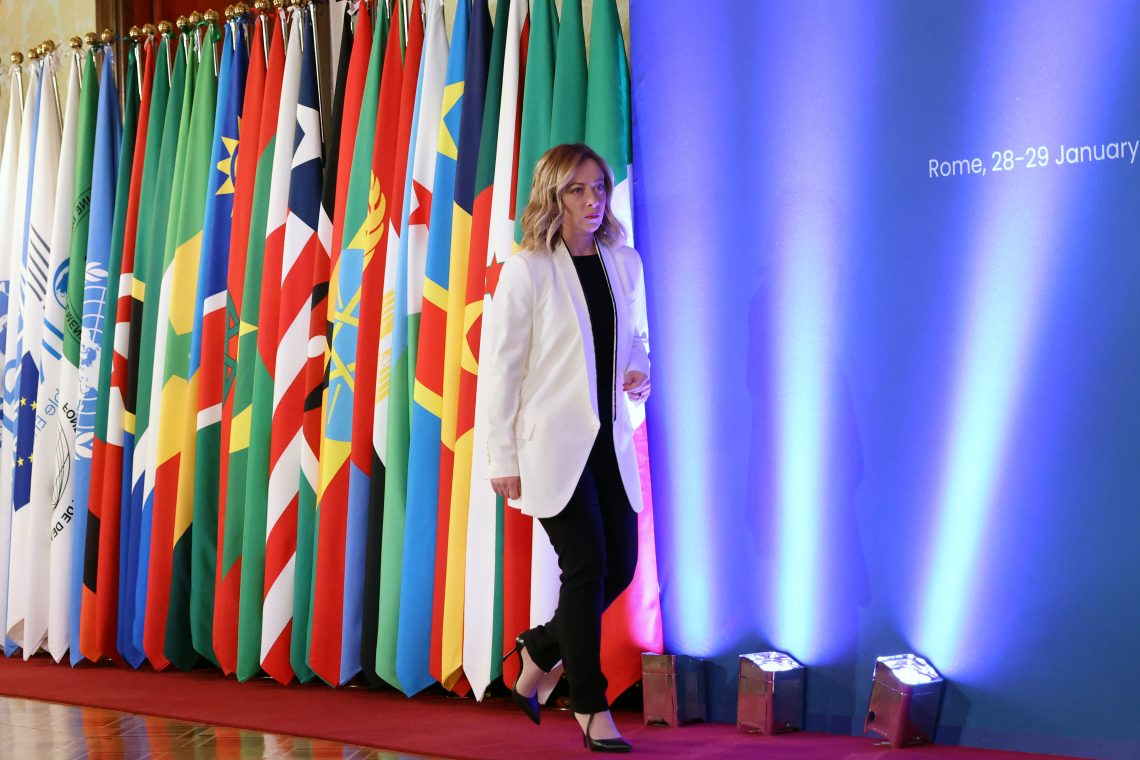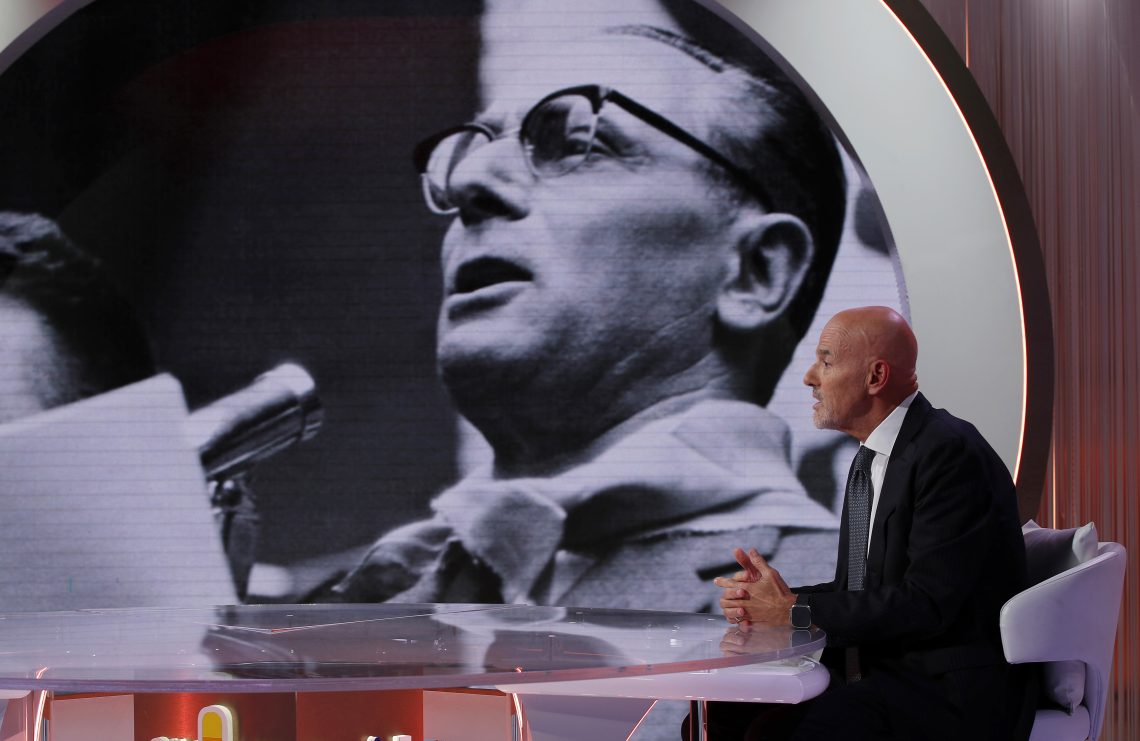Italy’s experiment: The Mattei Plan for Africa
Prime Minister Meloni wants to revolutionize Italy’s relationship with Africa. The plan has merits, but it would take more than one European country’s involvement to make it work.

In a nutshell
- Energy-thirsty and flooded by migrants, Italy needs new Africa policies
- Rome is trying to forge stable relationships on the continent
- Prime Minister Meloni’s plan could work if the rest of the EU participates
Giorgia Meloni, Italy’s prime minister since October 2022, has launched a significant foreign policy shift that seeks to restructure her country’s cooperation with the African continent.
It is not that her predecessors had always ignored Europe’s gigantic neighbor across the Mediterranean: In her new strategy, Ms. Meloni reaches back to the approach developed by Enrico Mattei, the head of the country’s energy giant, Eni, in the 20th century. The prime minister’s aim is to build relations with African countries so that these ties are no longer subject to short-term fluctuations – rocked by crises and dictated by responses to contingencies, as is the unfortunate norm these days.
The Meloni government seeks to set a foundation of wide-ranging trade flows, investment and inter-state cooperation schemes. Such a broad-based approach, the Meloni cabinet hopes, should enable Italy to better tackle the ongoing flows of undocumented migrants. Welcome to the Mattei Plan.
Facts & figures
Factbox: Mattei’s Eni, the energy industry’s outlier
Enrico Mattei (1906-1962), the founder and president of Eni – National Hydrocarbon Corporation (Ente Nazionale Idrocarburi, established in 1953) – was one of Italy’s leading 20th century business figures. He negotiated extensive oil concessions in the Middle East and a significant trade agreement with the Soviet Union. Killed in a plane crash whose cause remains a mystery, he was a visionary who sought to advance Italy’s role in the world. At a time when the oil and gas industry was an oligopoly of the Western “Seven Sisters” – large companies that dictated prices to buyers and exploited producing countries – Mattei’s Eni put forth the novel idea of his firm’s partnering up with host nations. Eni guaranteed them most of the revenue (usually 75%) and supported local development and welfare-building schemes. With this non-predatory approach, Eni has managed to retain a productive presence in the most challenging corners of the world, including the turbulent parts of North Africa.

Prime Minister Meloni hopes to build on Eni’s experience, and, typically for grand visions, she sets an ambitious target – that may prove too much of a reach.
When she started in office, Africa was critically important to all of Europe due to the emergency caused by Russian aggression against Ukraine, which forced the European Union to seek alternative gas and oil supplies quickly. Along with other EU leaders, Ms. Meloni trekked to North African countries such as Algeria, Libya and Tunisia, signing numerous agreements on energy supplies. Many of these deals, cut with autocratic regimes and attempting to link energy matters with curbs in migration flows, were hotly debated and deemed questionable by some in Europe.
Italy may be covered in terms of oil and gas, at the moment at least, but the same cannot be said for its problems with migration. Some argue that the crisis is overblown as Africa at large is experiencing a historic shift from agricultural to urban economies, which elevates incomes and, as a result, leads to declines in birth rates. Also, the optimists point out that most of the migratory flows originating in the continent are internal. However, parts of the continent are also feeling the heavy impact of climate change, with dire economic and political fallouts. These are powerful “push factors” for north-bound migrations to Europe.
Prime Minister Meloni’s project has had a strong start – especially as it seems to fit into the commission’s proposed agreement on migrants and asylum.
The Mattei Plan unveiled
In early January 2024, the Mattei Plan was ratified by the Italian Chamber of Deputies. Soon, Rome arranged an “Italy-Africa” summit attended by over two dozen African leaders and European Union officials, led by European Commission President Ursula von der Leyen. With such an anointment, Prime Minister Meloni’s project has had a strong start – especially as it seems to fit into the commission’s proposed agreement on migrants and asylum.
The Mattei Plan has a four-year horizon. It foresees significant investments to enable African countries to develop and improve their energy infrastructure. Also, it has provisions for Italy’s support – and presumably the EU’s – for initiatives building up exports, food security and the sustainable exploitation of natural resources in Africa.
Read more on Europe’s migration challenges
- Will immigration sink the EU?
- Malta under pressure
- European migration as a political tool
- Is Sweden beginning to turn sour on immigration?
Yet the initiative has been met with much criticism in Italy. Critics argue that the country’s foreign affairs ministry should oversee such a project. However, Ms. Meloni wanted its “control room” to be created within Chigi Palace, the seat of the premiership, indicating the prime minister’s desire to centralize power. Skeptics also point out that tackling Italy’s problems with Africa is a very tall order, given the unending waves of migrants landing on Italian shores and Italy’s controversial management of the many challenges in Libya since 2011.
North Africa’s minefields
The Sahel has been the scene of numerous coups d’état (eight in seven countries in the last three years). In another blow to the continent’s stability, Mali, Burkina Faso and Niger have formally left the Economic Community of West African States, an important force for order in the region, despite repeated efforts at reconciliation.
With many African states plagued by social and humanitarian crises, foreign mercenaries, mainly from Russia, have been increasing their presence. So far, little is being done about that dangerous development. Add to the picture the apparent ambitions of China, the Persian Gulf states and Turkey to build their influence on the African continent, and it seems clear that Italy and the EU will need to reckon with these developing political, economic and military factors. But France’s 2023 disengagement from multiple Sahel countries indicates that Italy is down to one reliable partner in the region – the United States, and even then, only to a certain degree, as has been demonstrated by the latest developments in Niger.
The money problem
A final point concerns the funding of the Mattei Plan. The Italian government has allocated some 2.8 million euros for its “mission expenses” in 2024, but the full scope of the necessary investment on the ground remains anyone’s guess.
Italy is not a superpower: it cannot expect success acting alone as an agent of change on a vast, complex continent of 54 sovereign states with multifaceted needs.
In the Italian Senate on January 29, 2024, Prime Minister Meloni revealed in the presence of European and African leaders that an initial sum of 5.5 billion euros would be invested in “pilot projects” in Morocco, Mozambique, Tunisia, Egypt, Kenya, Algeria, Ivory Coast, the Democratic Republic of Congo and Ethiopia. The money would come from the Italian Climate Social Fund and Italian Cooperation resources. It is a considerable amount for Italy, and yet would be a drop in the bucket for the African continent. Given the precedent of much talk and little action, Moussa Faki, the African Union chair, openly expressed the doubts of his African colleagues and wondered aloud why they had not been consulted on critical points of Italy’s plan.
Scenarios
Most likely: The grand plan falls short
The Mattei Plan may appear to have much going for it, but several factors will likely hamper Rome’s attempts to implement it.
First, Italy is not a superpower. It cannot expect success acting alone as an agent of change on a vast, complex continent of 54 sovereign states with multifaceted needs. Will EU member states overlook their disagreements to act in Africa in a coordinated, purposeful fashion? And, very importantly, will Washington be ready to cooperate, initiating a virtuous circle involving other world powers? A handful of nations alone cannot address a continental problem.
Another issue is raw materials. By most estimates, Africa sits on about 30 percent of the metals and minerals needed for the global green energy transition and the broader economic transformation expected to occur over the coming decades. However, African ruling elites tend to be less pro-Western and more prone to corruption and backslides to authoritarian rule. This is a problem for Italy’s ambitions, particularly when one envisions gigantic, long-term investments in the continent.
And, finally, there is the issue of innovation. There has been much talk about gas-related supplies but little about innovative energy models. As Lorena Stella Martini, a European Council of Foreign Relations expert in Rome, observed: “[R]enewable energy has received only a fraction of the attention and funding devoted to the gas projects; Africa’s renewable potential, particularly the sub-Saharan, could be expressed by properly redirecting current investment flows.” So far, however, that has been a pipe dream.
For industry-specific scenarios and bespoke geopolitical intelligence, contact us and we will provide you with more information about our advisory services.









